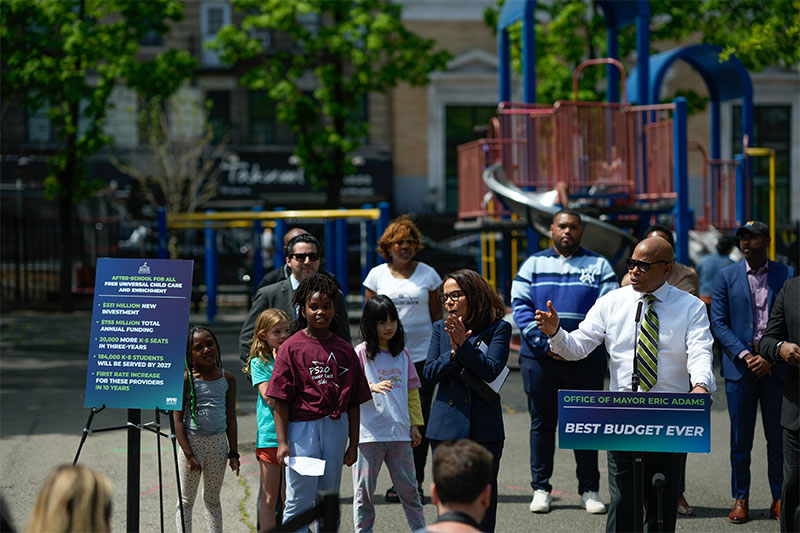NEWYORK: New York City Mayor Eric Adams and New York City Department of Youth and Community Development (DYCD) Commissioner Keith Howard announced a historic and new $331 million commitment — phased in starting in the upcoming Fiscal Year (FY) 2026 Executive Budget and fully baselined by FY 2028 — to support Mayor Adams’ vision of “After-School for All” to all public students from kindergarten through eighth grade.
For the first time ever, the city is beginning a comprehensive effort to strengthen and scale after-school programs with the goal of achieving universal access for all students and families across the five boroughs. The new funding will support the addition of 20,000 new seats over the next three school years, bringing the total number of public school students served by universal after-school programming to 184,000 with a total investment of $755 million annually.
“To make New York City the best place to raise a family, we need to make sure our young people and families have opportunities to thrive, and that is why we are launching a big, bold vision to achieve universal after-school for free for all students who want it,” said Mayor Adams.
“We’re investing $331 million in additional funds as part of our total $755 million investment in ‘After-School for All.’ This massive infusion of funds will improve our current programs and bring new after-school programs to an additional 20,000 K-5 students, serving a total 184,000 K-8 students. That’s 184,000 students who will be able to participate in sports, robotics, the arts, field trips, and more — discovering their passions and building relationships with their classmates. We are also pursuing a community-driven effort that will stabilize our current after-school system, ensuring these providers are able to get a rate increase for the first time in 10 years so they can hire and train staff, while delivering quality programming to our youth. Our parents shouldn’t have to choose between picking up their child or working a job to put food on the table — and now they won’t have to. This is what it looks like to deliver on our mission of making New York City a safer, more affordable city that is the best place to raise a family.”
“Mayor Adams’ commitment to early childhood development is truly unprecedented,” said First Deputy Mayor Randy Mastro.
“Now, he builds on that work with another signature achievement: a commitment to fund universal after-school programs for all public-school families who want it for their children. Just like universal pre-K, this initiative bookends early childhood education in the most positive way. It’s all about investing in our children’s futures — and today’s announcement will serve children for generations to come.”
“Today’s announcement on after-school is nothing short of a game-changer for New York City’s kids and families. Mayor Adams’ commitment to investing $331 million in new funding to expand and improve the Department of Youth and Community Development’s after-school system will transform child care in New York City forever, opening the door for thousands of families to take advantage of this valuable service,” said Deputy Mayor for Strategic Initiatives Ana J. Almanzar.
“After-school programs support kids, families, and the larger community — they are a common-sense investment of public resources. The commitment to building a universal system in the years ahead will expand the landscape of youth programs and child care for communities across the city.”
“Growing up in the Bronx, I was greatly influenced by after-school programs,” said DYCD Commissioner Howard.
“Juanita Howard, a single mother raising seven young children, worked as a registered nurse at the VA Hospital, and sent me and my siblings to after-school programs. She was so committed to it that I made sure my children attended, as well. I know firsthand the value of creating enriching and meaningful opportunities. Mayor Adams, who is making unprecedented commitments to our elementary school students, shares this sentiment. These investments help make our city more affordable and the best place to raise a family. I want to express my gratitude to our outstanding providers for their patience and partnership in creating the next generation of after-school programming. Together, we are closer than ever to fulfilling Mayor Adams’ vision for universal after-school.”
Mayor Adams’ After-School for All plan begins with an immediate $21 million investment allocated in the upcoming FY 2026 Executive Budget that will bring 5,000 additional K-5 seats online for the upcoming fall semester. That funding will grow to $102 million by the next fiscal year and $136 million, baselined annually, by FY 2028, as DYCD adds 10,000 more seats in the fall of 2026 and 5,000 seats in the fall of 2027, respectively, for a total of 20,000 new seats over the next three school years.
The funding for these new seats will be baselined starting in FY 2028 and become a permanent part of the city’s after-school offering, growing the annual budget to a total of $755 million for DYCD after-school programming.
Additionally, DYCD will work with the community to assess the ongoing need and add slots if necessary. The plan will also strengthen the current system by issuing the first Request for Proposal to providers in over a decade, in an effort to enhance and improve programs for New York City youth, as well as raise provider rates to stabilize the non-profit organizations leading these programs and better support the workforce who serve New York City’s children. This effort will be supported by a $195 million investment beginning in the FY 2027 Executive Budget, bringing the total new spending to approximately $331 million by FY 2028.
Across all DYCD programs, New York City currently serves approximately 164,000 K-8 students in after-school programs. Today’s investment by Mayor Adams will bring the total number of students served by the program to 184,000 by school year 2027-2028.
Currently, only one in five elementary school students can participate in after-school programming, compared to two in five for middle school students; this plan will add $331 million in new funds to the $424 million already allocated to after-school programming in the budget to focus on bringing seats to elementary schools in communities where demand meets need.
Additionally, the Adams administration will create a commission for universal after-school by engaging providers and community stakeholders to develop a system that is sustainable in the long term and ensures non-profit organizations are able to continue to hire and train staff and deliver quality programming.



